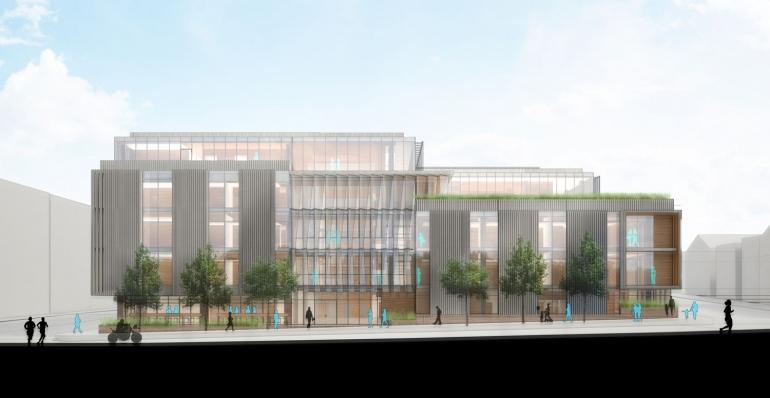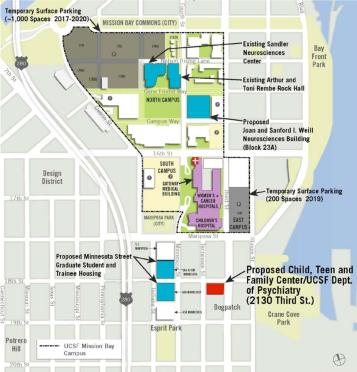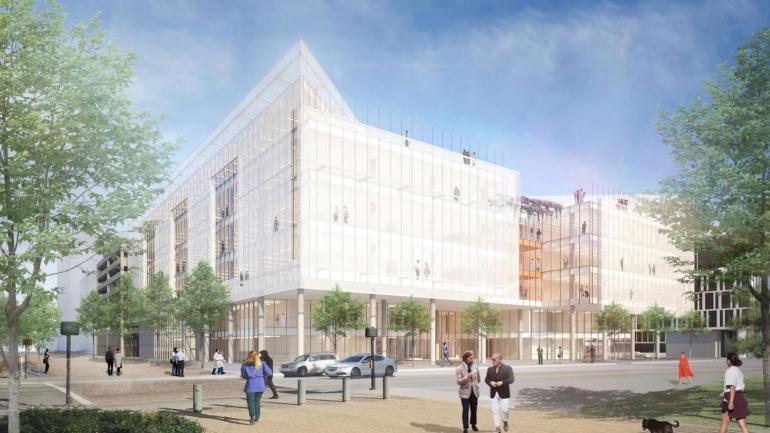By Mike Billings | Based on an article originally published on UCSF News

A rendered view of the UCSF Child, Teen and Family Center and Department of Psychiatry Building, from 18th Street.
The UC Board of Regents have approved plans for three new UC San Francisco building projects, including a new neuroscience building on the Mission Bay campus, as well as a new psychiatry building and student housing in the nearby Dogpatch neighborhood.
Two of the projects approved Thursday expand on UCSF's position as a national center for excellence in neurosciences and mental health that encompass clinical care, research and training. The largest project is the Joan and Sanford I. Weill Neurosciences Building, made possible by a landmark $185 million gift made last year by the Weills to establish the UCSF Weill Institute for Neurosciences. Another key investment is the UCSF Child, Teen and Family Center and Department of Psychiatry Building, funded by a $50 million anonymous donation announced in 2015 that will provide mental health services to Bay Area adults, children and families.
The third project, a graduate student and trainee housing complex on Minnesota Street, will advance UCSF’s efforts to provide more affordable housing options to offset the soaring cost of living in San Francisco.
Child, Teen and Family Center and Department of Psychiatry Building
Just one block south of the Mission Bay campus, the proposed UCSF Child, Teen and Family Center and Department of Psychiatry Building at 2130 Third Street will house outpatient mental health and related pediatric, neurology and pre-term birth obstetric clinics, education, research, office space and a small retail space.

Integrating clinical, training and research facilities in one building will allow patients and families to participate in cutting-edge clinical research at a single location in close proximity to wet research labs at UCSF’s Mission Bay campus and the UCSF Benioff Children’s Hospital San Francisco. It also will foster collaboration among scientists and clinicians to accelerate new discoveries in mental health and related fields.
The approximately 170,000 square feet in the building will be used for clinical services, clinical research, desktop research, and administrative functions, as well as meetings, education and retail. The meeting space within the building will provide a location where UCSF Psychiatry can host internal meetings and exchange expertise with San Francisco community and government partners. Parking that could accommodate up to 41 vehicles for outpatients and visitors will be located below ground.
Occupants of the building will include clinicians, educators, researchers and trainees who will be relocated from the Langley Porter Psychiatric Institute building on UCSF’s Parnassus campus, as well as some personnel from UCSF’s Laurel Heights and Mount Zion campuses. In addition, a clinical research program currently housed at the Priscilla Chan and Mark Zuckerberg San Francisco General Hospital and Trauma Center campus will be able to expand in this new building.
On Thursday, the Regents certified the Environmental Impact Report and approved the design of the project.
Construction of the building, which will be managed by a third-party developer before being leased back to the university, is estimated to begin in early 2018 and be completed by early 2020. Before construction begins, an existing three-story building and surface parking lot currently at the site will be demolished.
Joan and Sanford I. Weill Neurosciences Building

A rendered view of the Joan and Sanford I. Weill Neurosciences Building, the largest of three projects approved Thursday by the UC Board of Regents.
The Joan and Sanford I. Weill Neurosciences Building will become the headquarters for the UCSF Weill Institute for Neurosciences, bringing together the neurosciences community with bench laboratory research programs in psychiatry, neurology, neurosurgery and basic neuroscience, as well as desktop research, clinical research and clinical care space. Combined with the nearby Sandler Neurosciences Center and Arthur and Toni Rembe Rock Hall, the neuroscience complex at UCSF Mission Bay will become one of the largest in the world.
The 274,000-square-foot building – to be constructed on Block 23A, a surface parking lot between 3rd and 4th streets – will house wet or bench laboratories, office space and dry labs, clinical care services and clinical research space to meet expanded needs.
Collaborations between the UCSF Memory and Aging Center, the Global Brain Health Institute, the Kavli Institute for Fundamental Neuroscience and others are creating demand for wet research space that is co-located with dry research space. The wet research space also will be needed for the Department of Psychiatry close to its new administrative dry research and clinical home being planned for 2130 Third Street in the nearby Dogpatch neighborhood.
Neurology outpatient clinics on the ground and second floors will expand clinical offerings and consolidate more of UCSF Health’s neurology services at Mission Bay. Clinics currently located at UCSF’s Mount Zion campus and at 1500 Owens St. are unable to accommodate both current demands and projected growth.
On Thursday, the UC Regents approved the project budget of $357.6 million – to be funded from $141.6 million in external financing, $175 million in gifts and $41 million in campus funding – as well as the project scope and design. It also found the project to be in conformance with the California Environmental Quality Act.
Construction on the Weill Neurosciences Building will begin this year, and completion is targeted for 2020.
About UCSF Psychiatry
The UCSF Department of Psychiatry and the Langley Porter Psychiatric Institute are among the nation's foremost resources in the fields of child, adolescent, adult, and geriatric mental health. Together they constitute one of the largest departments in the UCSF School of Medicine and the UCSF Weill Institute for Neurosciences, with a mission focused on research (basic, translational, clinical), teaching, patient care and public service.
UCSF Psychiatry conducts its clinical, educational and research efforts at a variety of locations in Northern California, including UCSF campuses at Parnassus Heights, Mission Bay and Laurel Heights, UCSF Medical Center, UCSF Benioff Children's Hospitals, Zuckerberg San Francisco General Hospital and Trauma Center, the San Francisco VA Health Care System and UCSF Fresno.
About the UCSF Weill Institute for Neurosciences
The UCSF Weill Institute for Neurosciences, established by the extraordinary generosity of Joan and Sanford I. "Sandy" Weill, brings together world-class researchers with top-ranked physicians to solve some of the most complex challenges in the human brain.
The UCSF Weill Institute leverages UCSF’s unrivaled bench-to-bedside excellence in the neurosciences. It unites three UCSF departments—Neurology, Psychiatry, and Neurological Surgery—that are highly esteemed for both patient care and research, as well as the Neuroscience Graduate Program, a cross-disciplinary alliance of nearly 100 UCSF faculty members from 15 basic-science departments, as well as the UCSF Institute for Neurodegenerative Diseases, a multidisciplinary research center focused on finding effective treatments for Alzheimer’s disease, frontotemporal dementia, Parkinson’s disease, and other neurodegenerative disorders.
About UCSF
UC San Francisco (UCSF) is a leading university dedicated to promoting health worldwide through advanced biomedical research, graduate-level education in the life sciences and health professions, and excellence in patient care. It includes top-ranked graduate schools of dentistry, medicine, nursing and pharmacy; a graduate division with nationally renowned programs in basic, biomedical, translational and population sciences; and a preeminent biomedical research enterprise. It also includes UCSF Health, which comprises top-ranked hospitals – UCSF Medical Center and UCSF Benioff Children’s Hospitals in San Francisco and Oakland – and other partner and affiliated hospitals and healthcare providers throughout the Bay Area.





